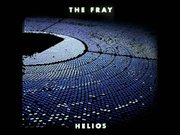It seems like ages since Colorado piano-pop band The Fray released something new, though it actually hasn't been at all. The band released the album "Scars and Stories" in 2012. However, when it comes to preserving mainstream popularity, two whole years are practically eons. Listening to the band's newest album, "Helios," I can't imagine this is what fans were waiting to hear. Occasionally, "Helios" offers more fundamentals, which is good news if you love The Fray—but it also offers comically abundant attempts to modernize the band's sound, which is bad news if you liked its music.
Firstly, I subscribe to the Billy Joel school of thought when it comes to pianos: First, key riffs can be a song's foundation and trimming; second, never fully tether the vocal melody to the riff's melody; and lastly but most importantly, it's OK to let the piano sound like a piano. The latter point has become an endangered sonic species, as modulated synths overtake mallet-hits-string pianos. "Helios" is no exception here.
Once, I had something of a soft spot for The Fray. However, "Helios" released me from whatever unspoken support I held for a number of reasons, not the least of which is the fact that it regularly breaks the cardinal rule for bands with signature instruments by abandoning the keys entirely. That's certainly the case in "Shadow and a Dancer," wherein synth pads answer the unwanted question of what The Fray would sound like if remixed by A Flock of Seagulls. It's not that the synths are bad; it's that they're everywhere in what is very clearly a piano ballad with an identity crisis.
At least a few other songs fare better, one being the opening track and obvious single "Hold My Hand," a fun, effective anthem that features a great use of sparing choral arrangement. It cleverly seesaws between the album's over-the-top synth and the acoustic piano from The Fray's previous offerings.
Another of the record's successes, "Love Don't Die," crests on a little of The Black Keys' bluesy darker tone and a dash of the folksy sing-along choruses like those of Edward Sharpe & the Magnetic Zeros. (Fear not, the song has a more recognizable sound than that bizarre description would suggest.) Likewise, "Our Last Days" and "Keep on Wanting" make for positive, if familiar, listening experiences than most of the record's runtime and, stylistically, are probably easiest to pair with The Fray's past hits like "You Found Me" and "How to Save a Life."
Part of me also wants to mention the bouncing, bare bones song "Wherever This Goes," as it has some generally good elements. While it has, for lack of a better term, a pretty cool feel and does deserve a spot on "Helios," it feels fairly stagnant on its own. Sure, I give a gentle round of applause for avoiding the trap of having the band build and explode at the tail end, but that ultimately just means it's pretty stationary.
Much of the album plays out in a similar fashion, with each song grasping at distinguishing or memorable factors beside more or less synth, more or less dance beat, or more or less resemblance to Kool & the Gang. Seriously, The Fray's "Give It Away" sounds like a mash-up of "Get Down on It," Christopher Cross' "Ride Like the Wind" and Daft Punk's "Get Lucky" minus whatever dynamic makes those songs work.
In fact, I suppose dynamics are where The Fray loses its footing the most, in essence. Through searching for a greater personality beyond "the raspy-voiced band with the piano," which is an understandable ambition, The Fray lost most of what made it instantly identifiable, culminating in a far less confident release than you'd expect from a band with multiple Grammy Award nominations. Few tracks sound similar to the others on "Helios," aiming to scratch the surface of many genres, but as a result and worse still, some tracks sound too similar to other contemporary and classic artists. While The Fray's "Helios" isn't a bad album, it is an unquestionably confusing one.




Comments
Use the comment form below to begin a discussion about this content.